Fading Footsteps in Luang Prabang: A Traveler’s Soliloquy
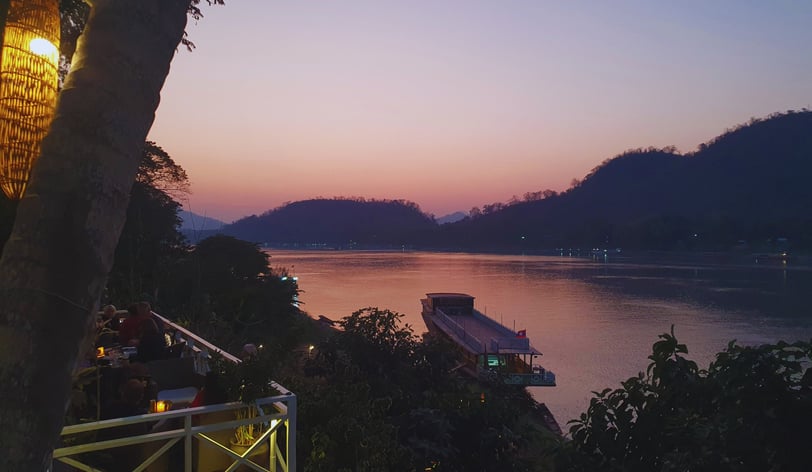

The guesthouse sat quietly near the river, tucked beneath the sprawling branches of an ancient frangipani tree. Its wooden balcony overlooked the Mekong, where boats drifted lazily, their reflections stretching across the rippling water. The owner—a woman whose presence felt as old as the place itself—greeted me with a knowing nod, as if she had seen travelers like me a thousand times before.
"Luang Prabang does not chase time," she murmured while handing me a key. "It waits for those who are willing to listen."
That night, I wandered through the old quarter, tracing the steps of the city’s past. I passed Wat Mai, its golden façade glowing beneath the lantern-lit sky, and followed the scent of fresh lemongrass toward the Night Market, where artisans arranged delicate silver bracelets and woven fabrics with quiet precision.
Near the edge of town, I stumbled upon a bookshop—dusty, dimly lit, brimming with volumes whose pages had softened over decades. A man with ink-stained fingers nodded toward a leather-bound journal resting on a wooden shelf. Inside, a single sentence had been scrawled:
"I sat by the river and thought I heard my own name, but it was only the wind."
Something about the words felt familiar, though I couldn’t place why.
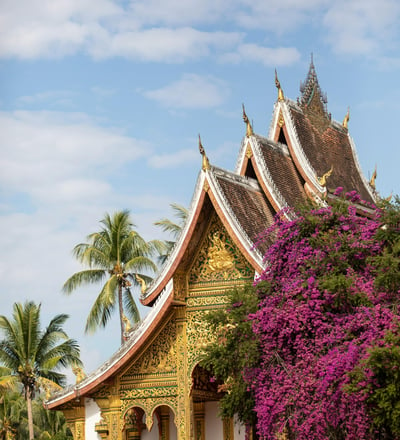

I woke early, before the city had fully stirred. A faint mist clung to the surface of the Mekong, blurring the shapes of wooden boats moored along the riverbank. Across the water, the jungle remained hushed, its dense green folds holding secrets in their silence.
Following a narrow path, I found myself near Mount Phousi, where the golden stupa at the summit gleamed like a beacon against the morning sky. The climb was unhurried—each step felt like a meditation, an offering of time to a city that asked for nothing but patience.
At the top, monks in deep saffron robes stood quietly, their gazes lost in the distance. Below us, Luang Prabang unfolded in soft hues—terracotta rooftops, winding streets, the gentle curve of the Nam Khan River. The moment held weight, as if the city whispered an invitation to linger, to listen.
Descending slowly, I wandered through the quiet alleys, past wooden shutters creaking open to greet the day. Locals prepared sticky rice offerings, arranging them carefully on woven trays before stepping barefoot toward the temples. The rhythm was slow, deliberate—there was no urgency, no rush.
In one of the temple courtyards, I noticed a boy sketching with charcoal on a scrap of paper. His strokes were fluid, each line forming the silhouette of a seated figure—perhaps a monk, perhaps an ancestor.
"Are you drawing someone you know?" I asked.
He looked up, his expression thoughtful. "No," he replied. "But maybe I will, one day."
The answer lingered with me, like the faint scent of incense curling into the cool air.
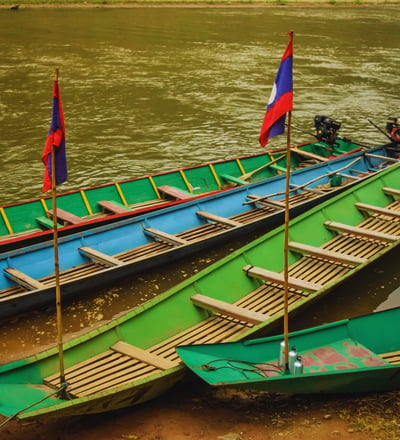

Later that afternoon, I found myself at the edge of the Nam Khan River, where wooden bridges stretched precariously across the water. The scent of grilled fish and tamarind filled the air as small family-run food stalls prepared for the evening rush.
I stopped at one of them, watching as an elderly man carefully sliced papaya, his movements steady, practiced. He glanced up and nodded toward a small bench beside him.
By the time I reached my room, the Mekong had grown dark, its surface a mirror of the night sky. I sat by the window, notebook open, attempting to translate the feeling that had settled within me—something unspoken, something weightless, yet deeply present.
"Luang Prabang does not chase time." The owner’s words echoed again in my mind.
And perhaps, neither should I.
"You are not from here," he observed, handing me a plate.
I shook my head, offering a smile. "Just passing through."
"Everyone is," he replied simply, stirring a pot of steaming broth.
There was no sadness in his voice—only acceptance. Luang Prabang was a place that held memories, but never tried to keep them. It allowed travelers to come and go, like the river itself, carrying stories without resistance.
As the sun began to dip behind the distant hills, I took the long way back to the guesthouse. The lanterns had started to flicker to life, casting soft golden halos against the wooden façades. The streets were quieter now, save for the occasional whisper of footsteps against cobblestones.
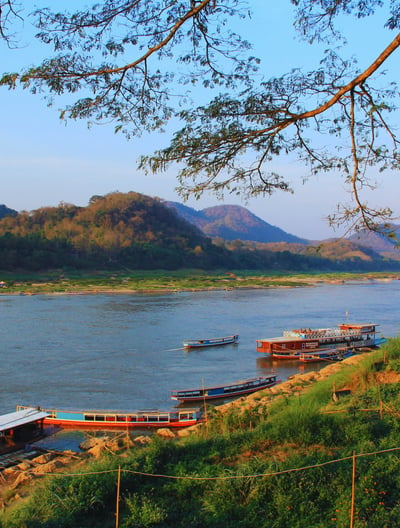

The next morning, the rhythmic sound of bells echoed through the streets, announcing the arrival of dawn. The city stirred gently, like a dream easing into wakefulness. I stepped outside and found the monks moving in quiet procession, their bowls open to receive offerings of warm rice and fruit from locals kneeling by the roadside.
I observed in silence, watching as each movement unfolded with grace—nothing hurried, nothing forced. It wasn’t just a tradition; it was a conversation between the present and the past, between fleeting moments and timeless rituals.
Because Luang Prabang does not chase time.
It simply waits for those who are willing to listen.
The air carried the scent of damp earth and the lingering trace of burning incense. I stepped into the quiet courtyard of Wat Xieng Thong, the temple’s golden edges catching the last light of dusk. There was a weight in the silence, as if history itself had settled into the stones beneath my feet.
Later, I drifted toward the banks of the Mekong, its waters moving with the same patient certainty as everything else in this city. A fisherman sat nearby, threading his net with deliberate care. I asked him how long he had been fishing.
"Long enough to know the river remembers," he said simply, casting his net into the current.
His words echoed within me. There was something about Luang Prabang—its rhythm, its silence—that carried traces of those who had passed through before. Every step I took felt like a whisper from someone who had walked that same path years ago.
As I prepared to leave, I sat by the river one last time, staring at the way the water folded over itself in endless motion. My footsteps might fade from the cobbled streets, my presence might disappear into the thick air of another quiet evening—but the feeling, the memory, would remain.
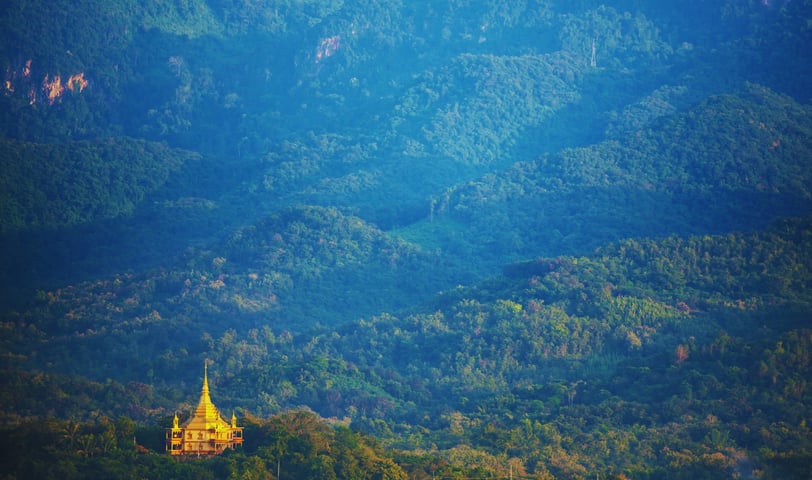

I found a spot near the entrance and watched as a group of young monks in saffron robes moved between the archways, their footsteps light, their expressions tranquil. One of them glanced my way—a brief meeting of eyes, neither intrusive nor expectant. There was an understanding in the gaze, unspoken but felt.
Beyond the temple walls, the sound of the Nam Khan River hummed softly, threading its way between the bends of the old town. I had planned to leave the next morning, but something in the city’s stillness made me hesitate.
"Stay a little longer," a voice in my mind whispered, though I couldn’t tell whether it was my own longing or the city itself calling me back.
As I stood, preparing to walk back to my guesthouse, I reached into my pocket and pulled out the journal I had found at the bookshop. The words scrawled inside still lingered with me:
"I sat by the river and thought I heard my own name, but it was only the wind."
For those whose footsteps fade into the quiet streets of Luang Prabang, the journey does not end—it simply shifts. Let the city reveal its timeless rhythm in Destinations "Luang Prabang: Where the River Remembers".
To uncover the deeper layers of Luang Prabang’s soul—its temples, artisans, and river whispers—step into a broader narrative. Find these timeless stories in Travel Insights — "Luang Prabang 2025: Timeless Temples, Artisan Legacies, and River Whispers."
✉️ Contact:
Curated by TrueTrip Hub |
© 2025 Invisible Atlas — All rights reserved.
Invisible Atlas
Journey Beyond the Visible
invisible.atlas@truetriphub.com
